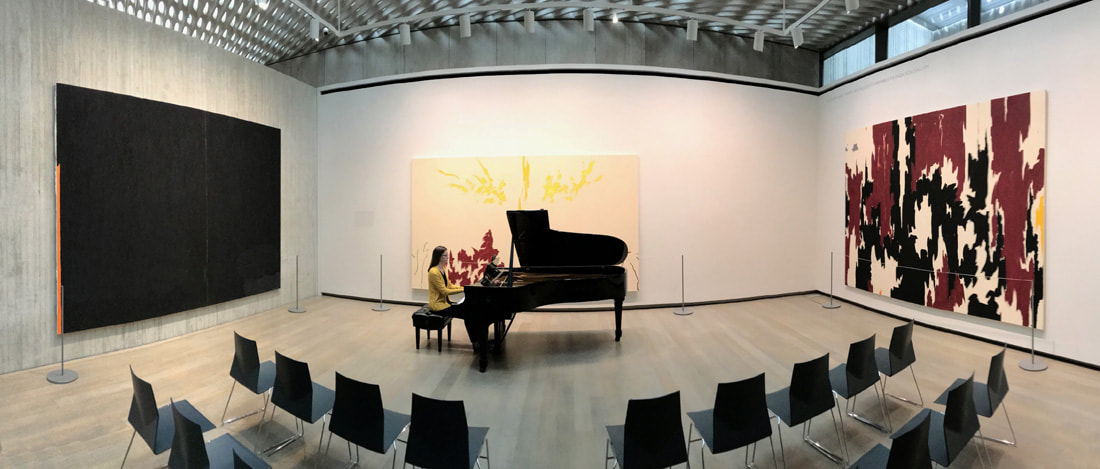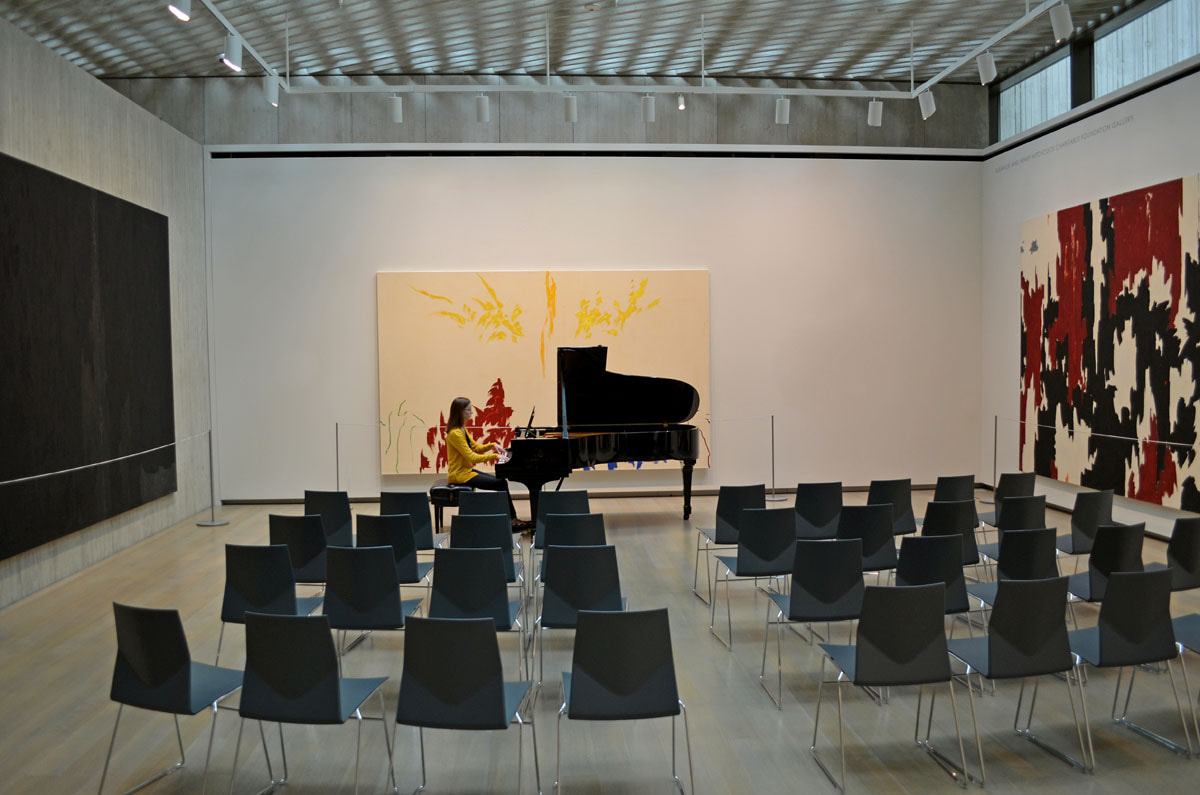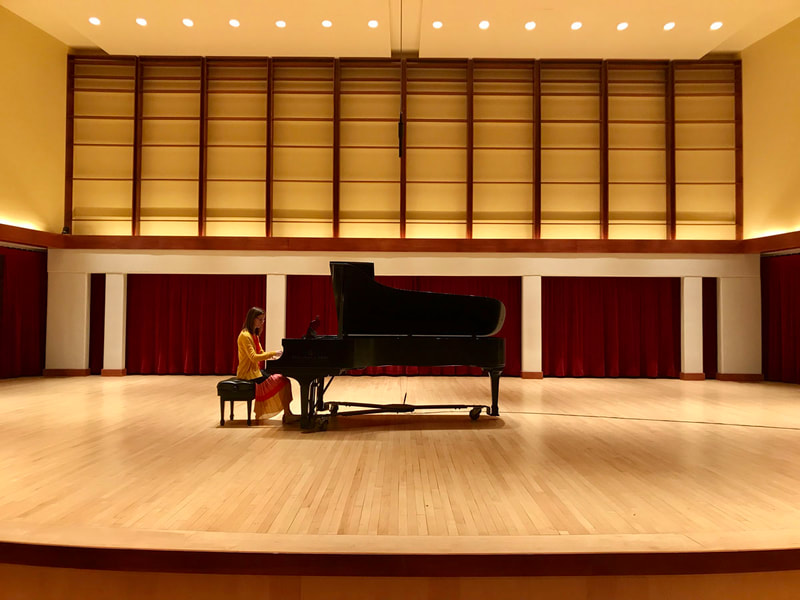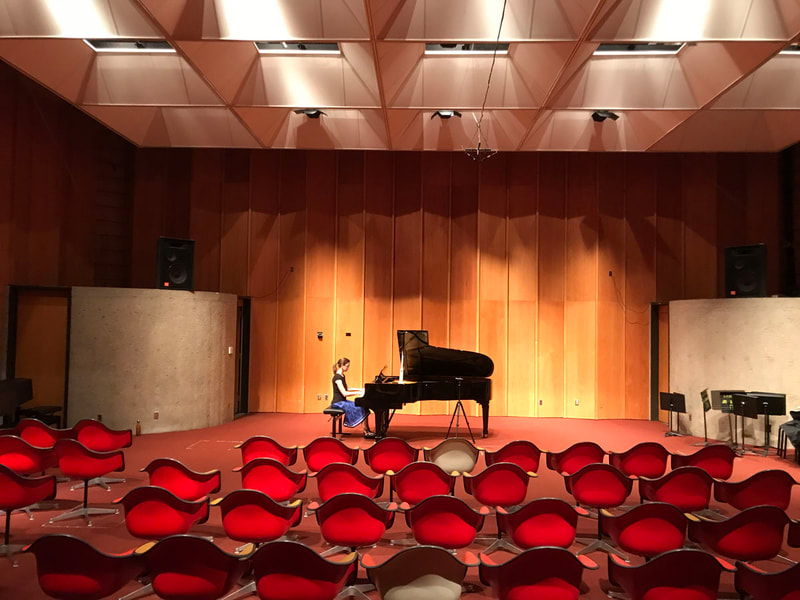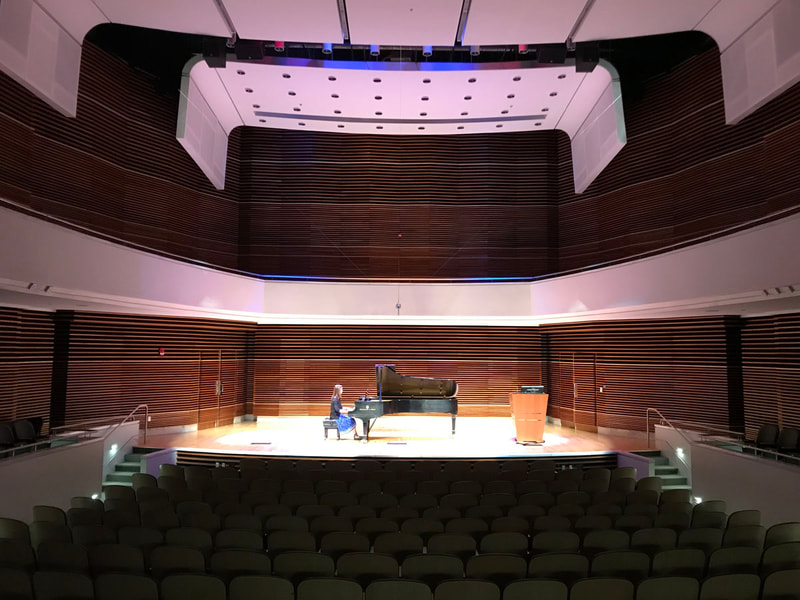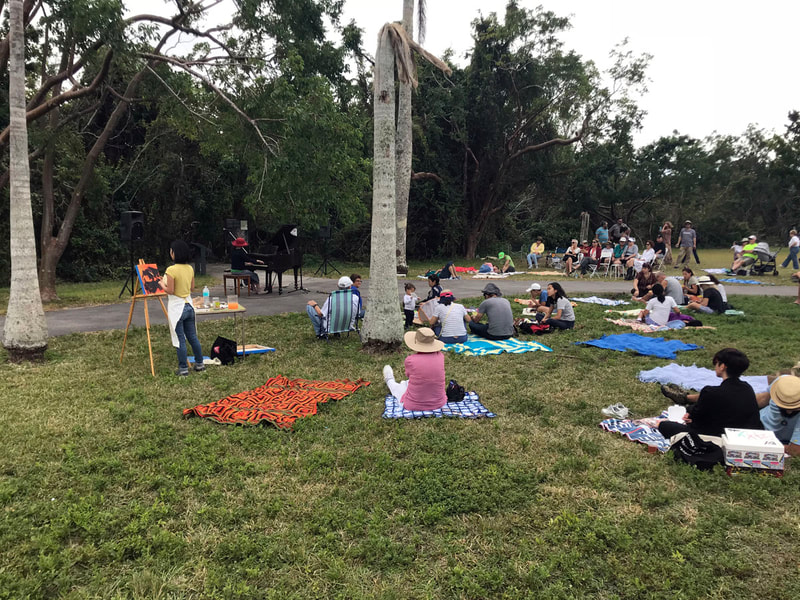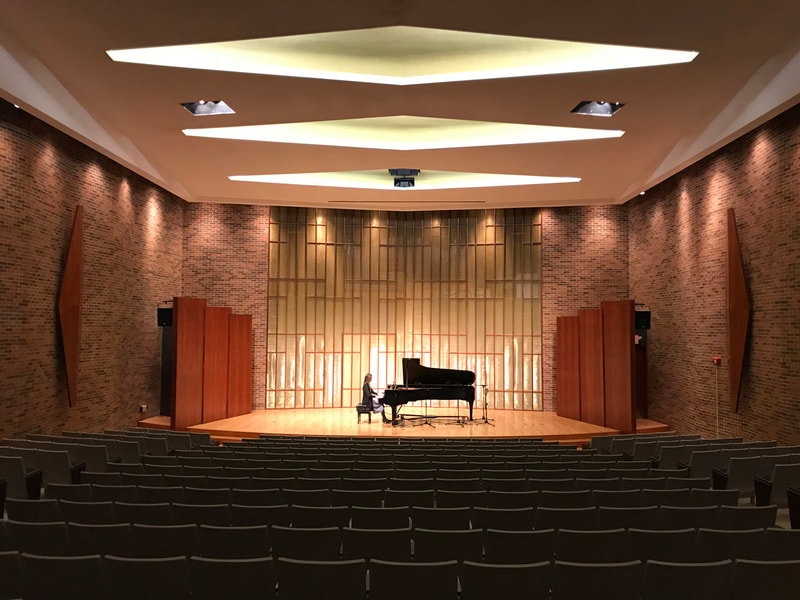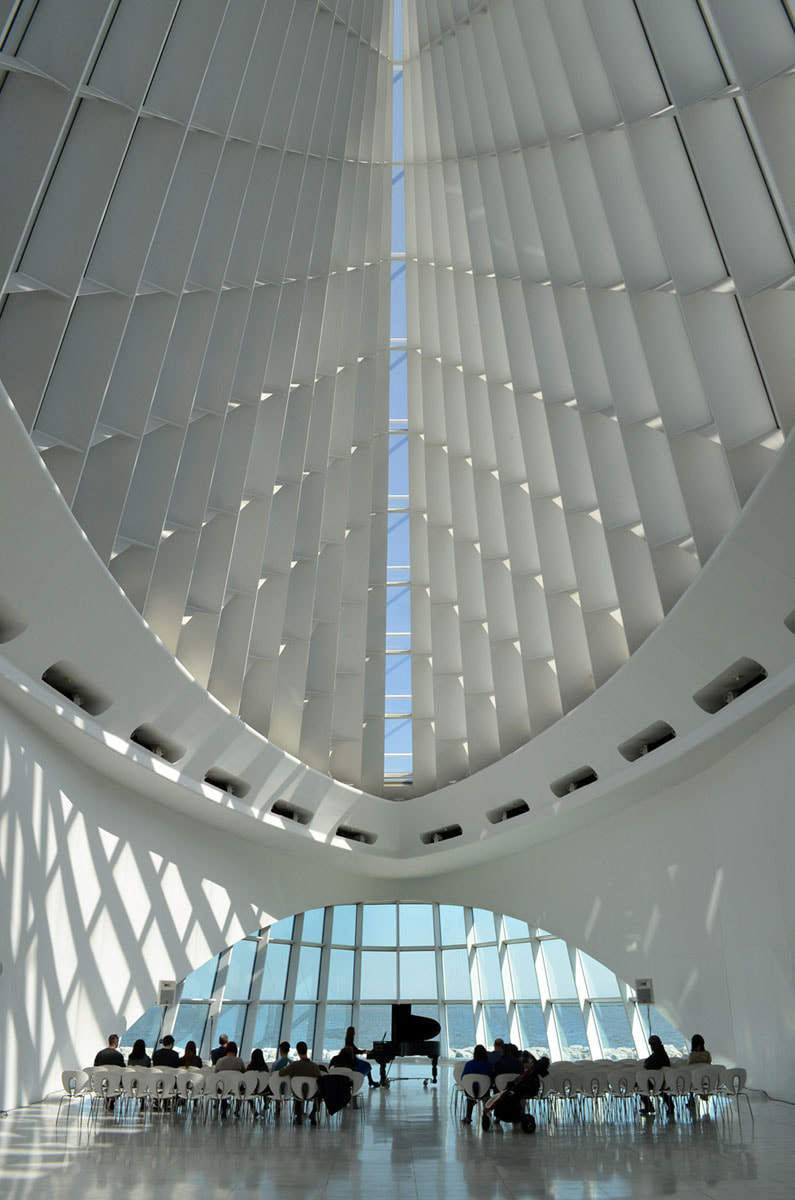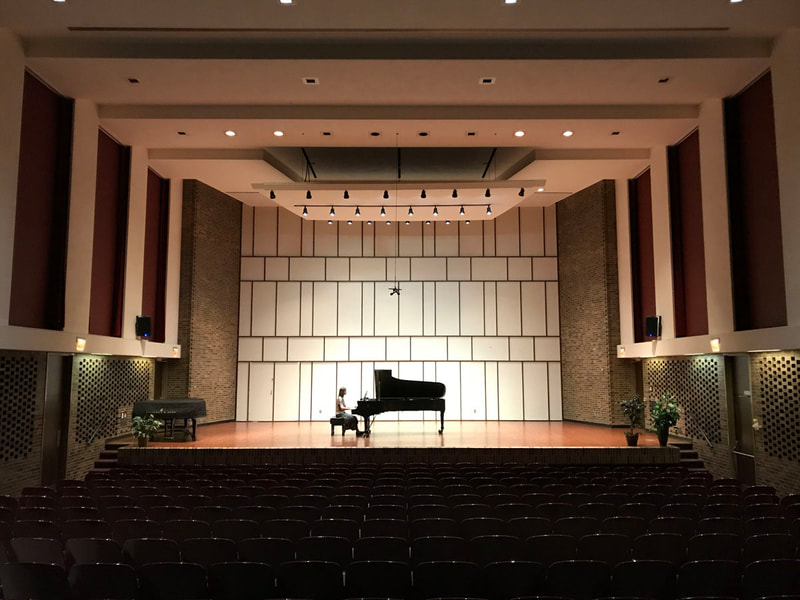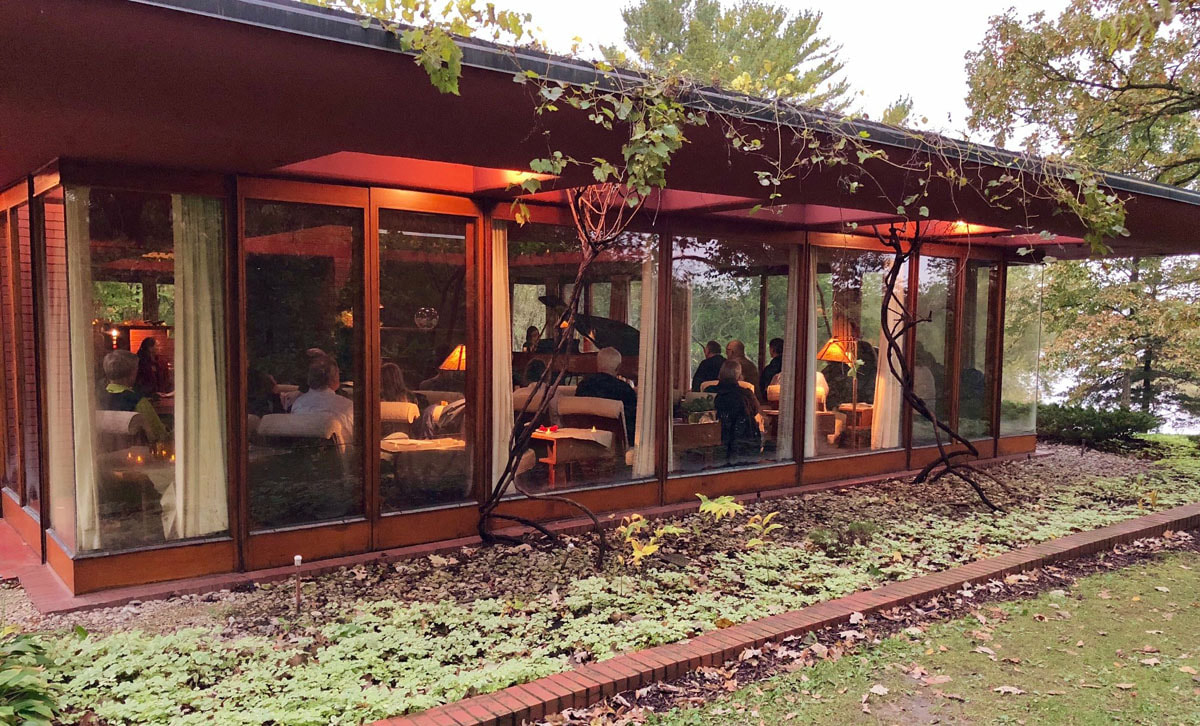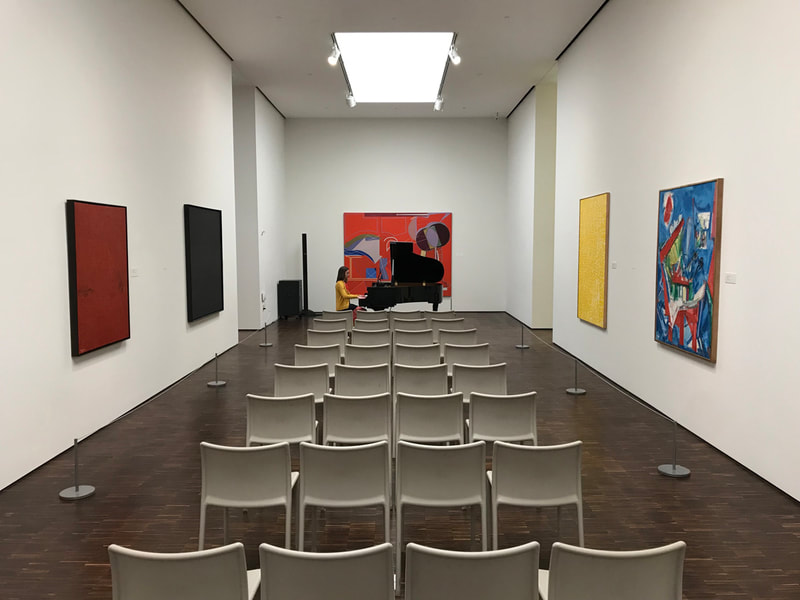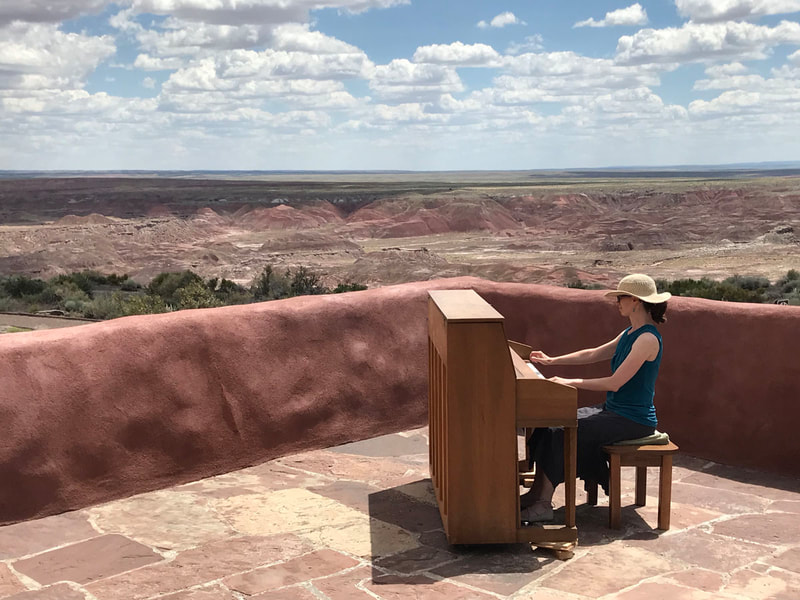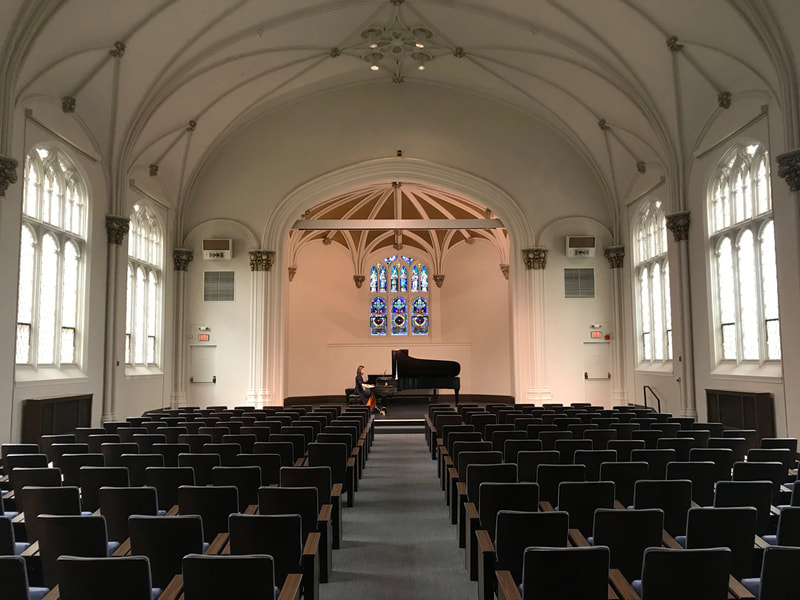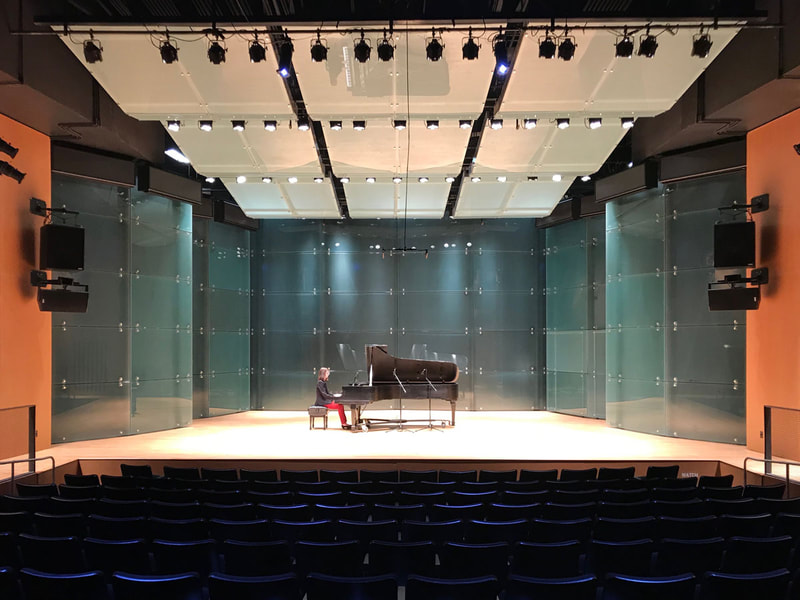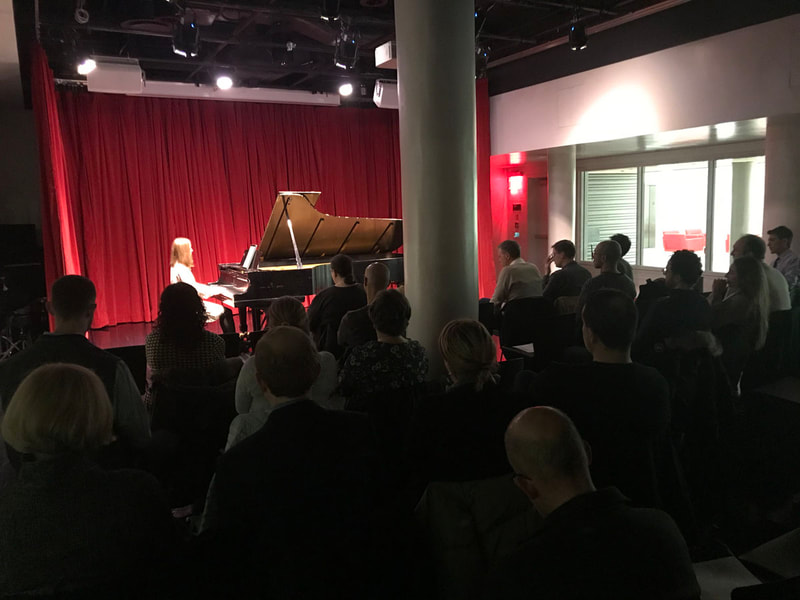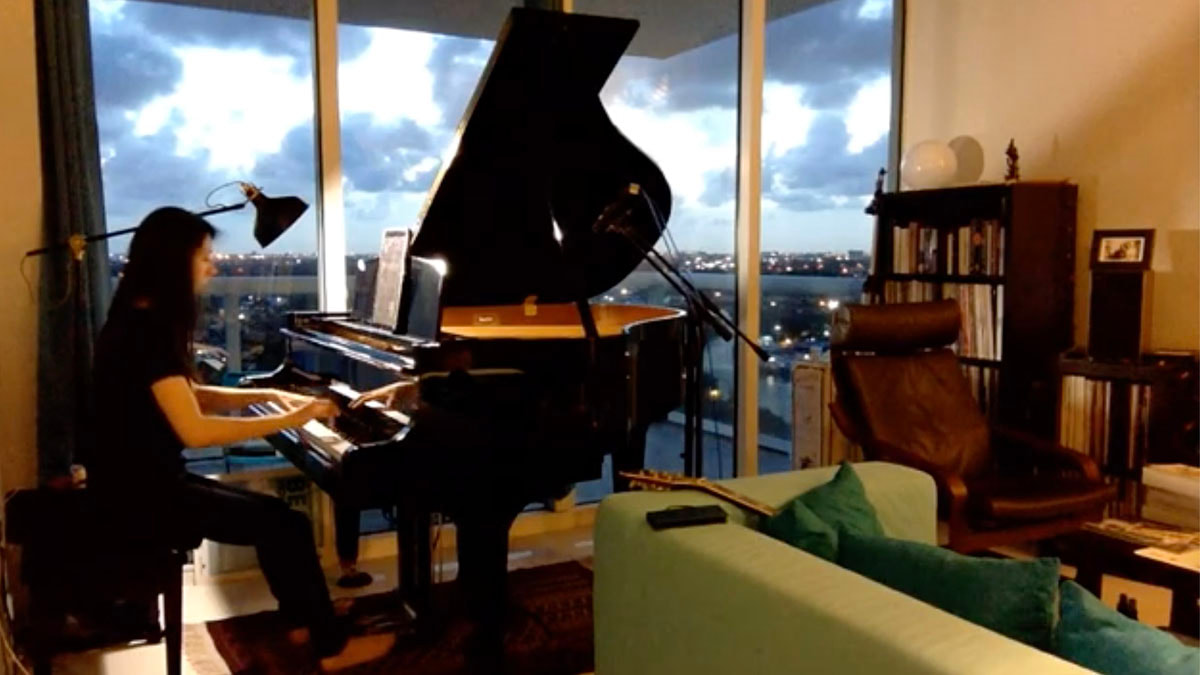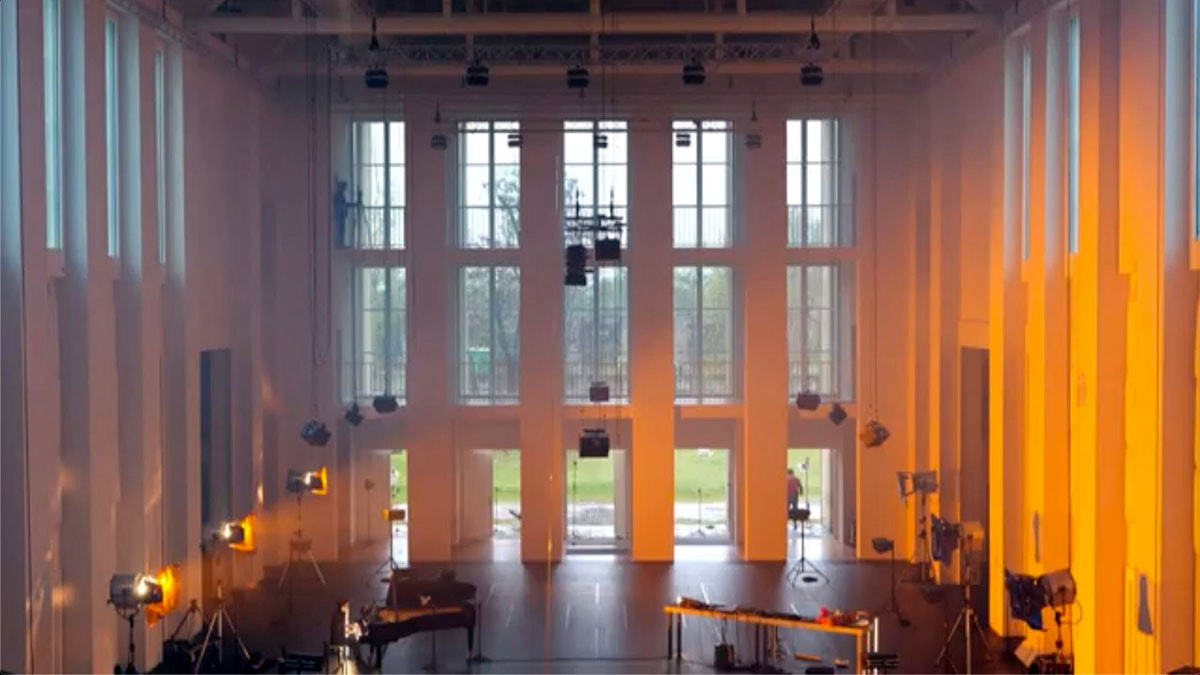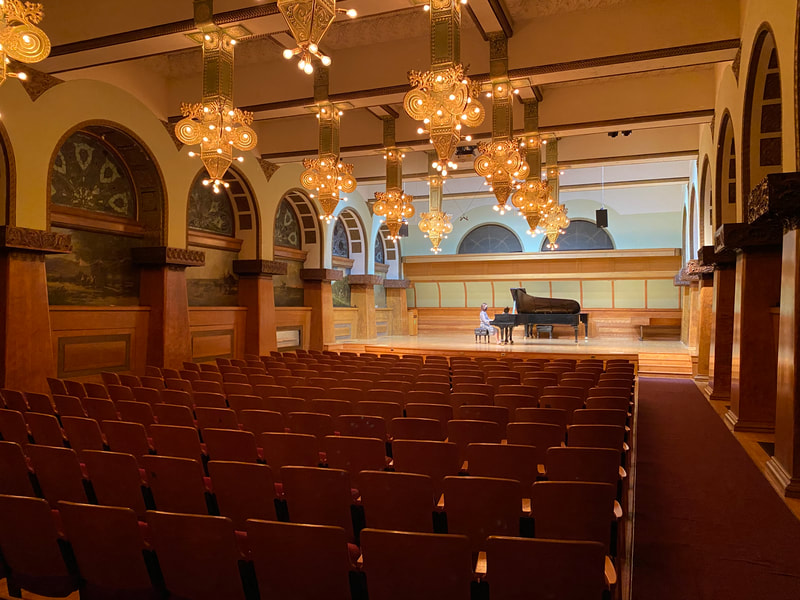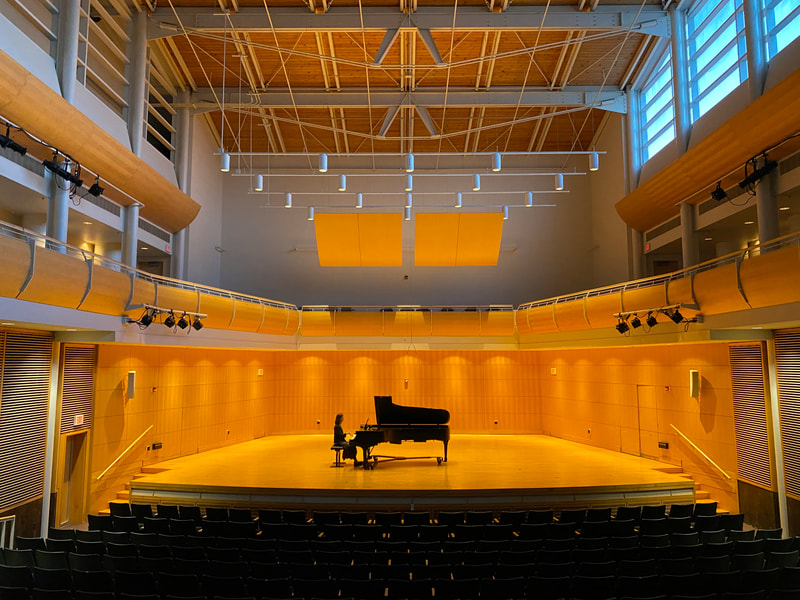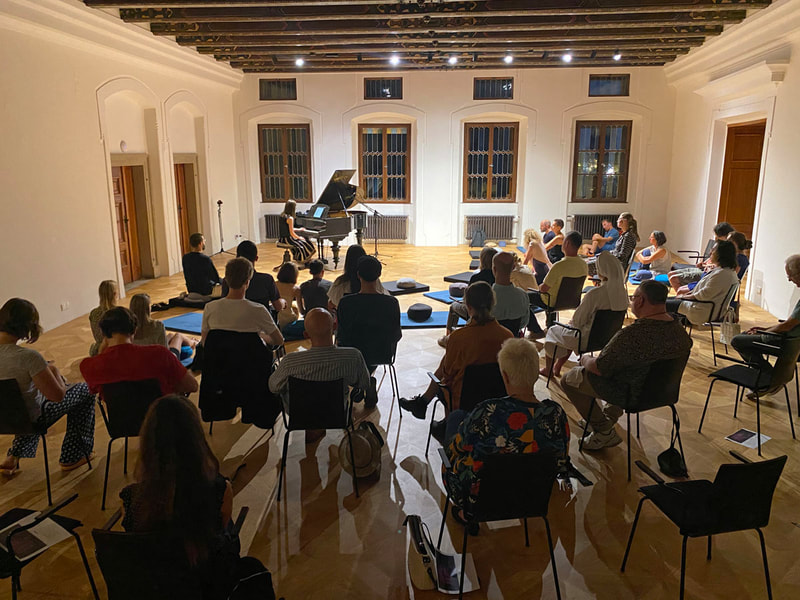Still (2016)
for solo piano
WATCH
LISTEN (excerpt)
Ashlee Mack, piano
PREVIEW / PURCHASE
PROGRAM NOTE
Still, for solo piano, was commissioned in 2016 by Ashlee Mack, Carl Patrick Bolleia, Louis Goldstein, Michiko Saiki, and Paola Savvidou, with additional support provided by the Clyfford Still Museum (Denver, Colorado). The work was a finalist for the 2019 Pulitzer Prize in Music, and a recording by Ashlee Mack is available on New World Records. Still has been performed in concert halls, art museums, historic homes, and in plein air performances at national parks. As the work unfolds over the course of approximately 54 minutes, a strand of 24 pitches (a linear concatenation of eight unique trichords) is gradually revealed via a series of 43 iterations of equal duration performed without pause. Each iteration comprises three, four, five, or six pitch-classes, progressing successively in a repeating pattern of 3–4–5–6–5–4–3.... Because iterations containing a larger number of pitches also incorporate a higher degree of musical activity, seven large-scale arcs of rhythmic density are formed over the duration of the piece. On the musical surface, each of the 43 iterations contain a similar arc of intensity, resulting in a fluctuation of moment-to-moment activity that corresponds isomorphically to the work's large-scale structure. The music is inspired by the paintings of American abstract expressionist Clyfford Still, who felt that his work was best appreciated when shown in a gallery containing only his work. He preferred not to sell his paintings, and on the rare occasions when he did he endeavored to keep the works together in groups. Collections that he parted with during his lifetime can be seen at the Metropolitan Museum of Art in New York, the Hirshhorn Museum in Washington, the San Francisco Museum of Modern art, and the Albright-Knox Gallery in Buffalo. Aside from these exceptions, and a smattering of single paintings and small collections held elsewhere, most (95%) of his work was held in storage during his lifetime. After his death in 1980, his estate searched for an American city willing to house the enormous collection, and In 2011 the Clyfford Still Museum opened in Denver, Colorado. When visiting the Clyfford Still Museum, one wanders intuitively from work to work, making a variety of connections between different paintings. Each visitor has a unique experience, but because all the works come from a single creator a "big picture" eventually emerges. The goal of this piano piece is to create a similar environment, allowing a listener to develop a notion of the work’s entirety by listening to multiple iterative variations of harmony and rhythm (color and form). The inner repetitions and associations within and between the sections of music are likely to provide each listener with a unique experience, determined by whichever musical features are noted, remembered, and compared. It is the hope of the composer that Still is in some ways a "museum of sound" that provides each listener with a variety of aesthetic pathways to wander and explore.
Ashlee Mack in performance at the Clyfford Still Museum (Denver, Colorado) • October 5, 2017
"hypnotic... distills music to its barest essences" — Citation, 2019 Pulitzer Prize in Music
"profoundly meditative, haunting" — The Wire
"develops with the naturalness of breathing" — The New Yorker
"a vast space, both broad and deep" — Fanfare
"unfolds in sparse, slow-moving beauty" — San Francisco Chronicle
UPCOMING PERFORMANCES
TBA
PAST PERFORMANCES
11-09-23 Prague Quiet Music Festival (Ashlee Mack)
03-22-22 Francis Marion University (Ashlee Mack)
03-17-22 Penn State University (Ashlee Mack)
10-08-21 North Star Music Festival — Truman State University (Ashlee Mack)
10-06-21 Roosevelt University (Ashlee Mack)
05-02-21 Festspielhaus Hellerau — Dresden (Michiko Saiki)
07-24-20 Misty Shore Salon — Miami (Chen-Hui Jen)
12-02-19 The Stone — New York City (Ashlee Mack)
10-12-19 Eastern Illinois University (Ashlee Mack)
09-22-19 Webster University (Ashlee Mack)
09-12-19 Illinois State University (Ashlee Mack)
09-04-19 Western Illinois University (Ashlee Mack)
06-22-19 Petrified Forest National Park (Ashlee Mack)
05-05-19 Timucua Arts Foundation (Louis Goldstein)
04-03-19 Rochester, NY (Michiko Saiki)
04-11-19 Lawrence Conservatory (Ashlee Mack)
02-26-19 Wake Forest University (Louis Goldstein)
02-21-19 University of Louisville (Louis Goldstein)
02-10-19 Tolstefanz, Germany (Michiko Saiki)
01-24-19 Cincinnati Conservatory (Ashlee Mack)
11-01-18 Figge Art Museum (Ashlee Mack)
10-11-18 University of Denver (Ashlee Mack)
10-07-18 Montauk Historic Site — Clermont, IA (Ashlee Mack)
10-06-18 Cedar Rock Estate — Quasqueton, IA (Ashlee Mack)
10-04-18 Porter House Museum — Decorah, IA (Ashlee Mack)
09-28-18 St. Ambrose University (Ashlee Mack)
09-23-18 University of Wisconsin–Whitewater (Ashlee Mack)
07-25-18 Darmstadt Musikinstitut (Michiko Saiki)
03-10-18 Milwaukee Art Museum (Ashlee Mack)
03-08-18 University of Wisconsin–Milwaukee (Ashlee Mack)
02-02-18 Butler University (Ashlee Mack)
01-26-18 Knox College (Ashlee Mack)
12-17-17 Everglades National Park (Ashlee Mack)
12-08-17 University of Miami (Ashlee Mack)
11-28-17 Murray State University (Ashlee Mack)
10-25-17 Carleton College (Ashlee Mack)
10-23-17 University of Minnesota (Ashlee Mack)
10-19-17 University of Tennessee–Knoxville (Ashlee Mack)
10-11-17 University of Northern Colorado (Ashlee Mack)
10-06-17 Metropolitan State University (Ashlee Mack)
10-06-17 Clyfford Still Museum (Ashlee Mack)
10-05-17 Clyfford Still Museum (Ashlee Mack)
10-05-17 University of Denver (Ashlee Mack)
10-04-17 University of Colorado–Boulder (Ashlee Mack)
10-02-17 University of Nebraska–Kearney (Ashlee Mack)
09-29-17 Bradley University (Ashlee Mack)
09-28-17 Illinois Wesleyan University (Ashlee Mack)
09-22-17 Northern Illinois University (Ashlee Mack)
09-20-17 Illinois College (Ashlee Mack)
09-19-17 Western Illinois University (Ashlee Mack)
03-22-22 Francis Marion University (Ashlee Mack)
03-17-22 Penn State University (Ashlee Mack)
10-08-21 North Star Music Festival — Truman State University (Ashlee Mack)
10-06-21 Roosevelt University (Ashlee Mack)
05-02-21 Festspielhaus Hellerau — Dresden (Michiko Saiki)
07-24-20 Misty Shore Salon — Miami (Chen-Hui Jen)
12-02-19 The Stone — New York City (Ashlee Mack)
10-12-19 Eastern Illinois University (Ashlee Mack)
09-22-19 Webster University (Ashlee Mack)
09-12-19 Illinois State University (Ashlee Mack)
09-04-19 Western Illinois University (Ashlee Mack)
06-22-19 Petrified Forest National Park (Ashlee Mack)
05-05-19 Timucua Arts Foundation (Louis Goldstein)
04-03-19 Rochester, NY (Michiko Saiki)
04-11-19 Lawrence Conservatory (Ashlee Mack)
02-26-19 Wake Forest University (Louis Goldstein)
02-21-19 University of Louisville (Louis Goldstein)
02-10-19 Tolstefanz, Germany (Michiko Saiki)
01-24-19 Cincinnati Conservatory (Ashlee Mack)
11-01-18 Figge Art Museum (Ashlee Mack)
10-11-18 University of Denver (Ashlee Mack)
10-07-18 Montauk Historic Site — Clermont, IA (Ashlee Mack)
10-06-18 Cedar Rock Estate — Quasqueton, IA (Ashlee Mack)
10-04-18 Porter House Museum — Decorah, IA (Ashlee Mack)
09-28-18 St. Ambrose University (Ashlee Mack)
09-23-18 University of Wisconsin–Whitewater (Ashlee Mack)
07-25-18 Darmstadt Musikinstitut (Michiko Saiki)
03-10-18 Milwaukee Art Museum (Ashlee Mack)
03-08-18 University of Wisconsin–Milwaukee (Ashlee Mack)
02-02-18 Butler University (Ashlee Mack)
01-26-18 Knox College (Ashlee Mack)
12-17-17 Everglades National Park (Ashlee Mack)
12-08-17 University of Miami (Ashlee Mack)
11-28-17 Murray State University (Ashlee Mack)
10-25-17 Carleton College (Ashlee Mack)
10-23-17 University of Minnesota (Ashlee Mack)
10-19-17 University of Tennessee–Knoxville (Ashlee Mack)
10-11-17 University of Northern Colorado (Ashlee Mack)
10-06-17 Metropolitan State University (Ashlee Mack)
10-06-17 Clyfford Still Museum (Ashlee Mack)
10-05-17 Clyfford Still Museum (Ashlee Mack)
10-05-17 University of Denver (Ashlee Mack)
10-04-17 University of Colorado–Boulder (Ashlee Mack)
10-02-17 University of Nebraska–Kearney (Ashlee Mack)
09-29-17 Bradley University (Ashlee Mack)
09-28-17 Illinois Wesleyan University (Ashlee Mack)
09-22-17 Northern Illinois University (Ashlee Mack)
09-20-17 Illinois College (Ashlee Mack)
09-19-17 Western Illinois University (Ashlee Mack)
DOWNLOADS
• Performance Photo (color) (b+w)
• New World Records liner note by Bruce Quaglia (pdf)
• Additional Notes (pdf)
• New World Records liner note by Bruce Quaglia (pdf)
• Additional Notes (pdf)
PHOTO GALLERY
